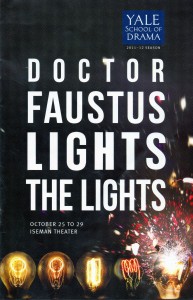Doctor Faustus Lights the Lights
Presented by the Yale School of Drama through Oct. 29 at the Iseman Theater. Written by Gertrude Stein. Directed by Lileana Blain-Cruz. Scenic Designer: Adam Rigg. Costume Designer: Jayoung Yoon. Lighting Designer: Masha Tsimring. Sound Designer: Elizabeth Atkinson. Projection Designer: Hannah Wasileski. Composer: Adrian Knight. Dramaturg: Sunder Ganglani. Stage Manager: Kirstin Hodges. Performed by William DeMerritt (Doctor Faustus), Lupita Nyong’O & Chris Henry (Mephisto/Doctor Faustus), Adina Verson (Marguerite Ida and Helena Anabel/Doctor Faustus), Alexandra Trow (Marguerite Ida and Helena Anabel/Little Boy and Girl/Doctor Faustus), Fisher Neal (The Dog/Doctor Faustus), Jillian Taylor (The Boy/Doctor Faustus), Hallie Cooper-Novack (Country Woman with the Sickle/Little Boys and Girl/Doctor Faustus), Seamus Mulcahy (Man from Overseas/Doctor Faustus),
Is he is he Doctor Faustus?
There is a cur with the countenance of an old man.
Two or seven speak for one.
A sickle sticks in a spiral staircase.
There could never be a “right way” of doing Doctor Faustus Lights the Lights. For starters, Gertrude Stein’s play is really a libretto for which the music was never written. Stein is also too attuned to the eye of the beholder—audience, director, reader—to deliver a piece that is not open to constant reinterpretation.
While Stein is clearly taking much of her Faust from Goethe’s—the prominence of Marguerite, the philosophical undertones, the religious rhetoric—I’ve always appreciated her grasp of Christopher Marlowe’s version of the ancient legend, with its gallows humor and comic wonderment and bold theatricality. Stein of course is also spinning a Faustus on her own terms. She seems to be warning of the dangers of blindly following. Her Faustus is the creator of an electric light bulb. This puts me in mind of the media critic Marshall McLuhan, who saw the light bulb as pure information, sort of a forbidden fruit of the electrical age.
I should add that McLuhan was not a fan of Stein, and once wrote “Jazz provides for the lazy and illiterate precisely what Stein and Joyce offer to more earnest folk: a carefully arranged reduction of consciousness to a moment by moment inconsequentiality. The latest name for this elaborate game of evading and abolishing reason and the rational content of experience is called Existenz (existentialism).”
It’s hard not to talk like that when confronted with Stein, even though her own style is famously sparse and direct. She emphasizes through repetition, not multisyllablism.
Lileana Blain-Cruz, who has staked out a reputation at the Yale School of Drama for deftly devising shows through collaborative ensemble work, translates Stein’s sense of echoing and repeating phrases into stagecraft by having two or more people voice one role at the same time. The actors all seem to have learned the play wholly, which adds to the depth of their performances in even the smallest voices. They also invest themselves in make-up, costumes and movements—some Fosse-esque choreography for the devil(s)—that add flash and glamour. When the characters must bare their souls, it helps that they have trappings to cast off.
Blain-Cruz is ambitious in her choice of material, but she has a sense of grace and balance that draws you in to Stein’s sometimes stultifying text. There is ample humor, starting with a Stein-like decree to “Turn off you cell phones. Turn off your cell phones.” You can feel the audience loosen up, laugh and smile, buying in to the literariness and the theatricality. There’s a spatial evenness to the spaced-out proceedings, which take place along a wide, floor-level stage divided into three parts with a slanty platform that looks like a public restroom floor in the middle.
Elements from ‘20s jazz and silent movies are well chosen, though Doctor Faustus Lights the Lights was written later than that, in 1938, the same year that Stein’s great friend Thornton Wilder premiered his Our Town.
Doctor Faustus Lights the Lights remains, dark, remote and operatic. But Lileana Blain-Cruz and her ensemble make it easy, even fun, to follow into the light.


Post-show I heard several “that sounded like Dr. Seuss” comments from audience members. Maybe Geisel was familiar with the play. (Based on your info above, I think he started publishing his books over a decade after Stein’s play.)
Could his pseudonym be a Dr. Faustus reference? Maybe he made some sort of deal with you-know-who…